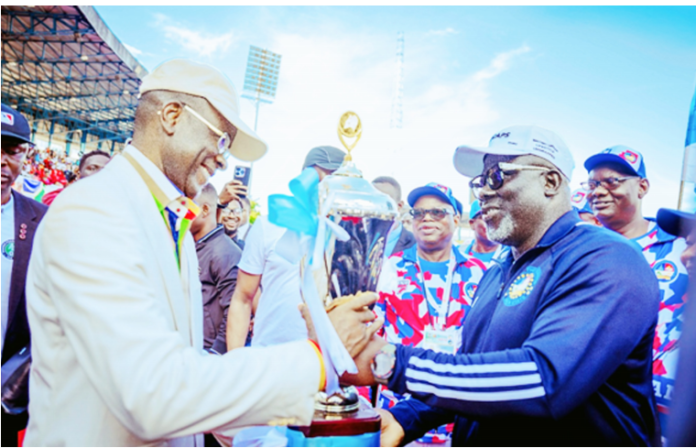NIGERIA’S treatment of its sports legends remains a sore point, casting doubt on the significance of patriotism and national loyalty. The country has long been criticised for its failure to honour and care for its heroes, particularly those in the sports field. This neglect of sportsmen who once brought glory to Nigeria serves as a stark reminder of the nation’s shabby reward system, which continues to fail its most dedicated citizens.
A stanza of Nigeria’s penultimate national anthem, which every citizen once solemnly recited, affirms that “the labour of our heroes past shall never be in vain.” It is a pledge that suggests recognition, respect, and perhaps tangible rewards for those who serve the nation distinctively. Yet, in practice, these promises are rarely fulfilled, as successive governments often turn a blind eye to the welfare of former athletes who had made significant sacrifices for the country.
The recent death of Peter Fregene, a legendary Nigerian goalkeeper and Olympian, is a painful example of this failure. Fregene, who represented Nigeria at the 1968 Olympics in Mexico and a key figure in the national football team throughout the 1960s and 1970s, spent his final days in ill health, struggling for survival. He was on life support at the Oghara Teaching Hospital before passing away at the age of 77. Known for his remarkable reflexes and resilience, Fregene earned the nickname ‘Apo’ for his incredible performances between the goalposts. Yet, in his twilight years, he received little of the support or recognition that he would have deserved in saner clime.
Fregene’s plight is not an isolated case. The stories of many Nigerian sports heroes after retirement are tales of neglect, poverty, and obscurity. Having dedicated their youthful days to serving their country, these athletes frequently find themselves without any form of financial security or institutional support when their sporting careers come to an end. Some die as paupers and are forgotten in their lonely graves scattered all over the country.
The harsh reality for many Nigerian sportsmen is that their careers, which once brought them momentary fame and modest earnings, do not prepare them for life after sports. The financial rewards they receive during their playing years are often insufficient, and there is no support system in place to help them transition into other opportunities within the sports industry. This failure to provide a safety net for retired athletes is a major reason why many Nigerian sportsmen face financial hardship later in life.
While there have been some positive developments in recent years, with former sportsmen such as Jay JayOkocha, KanuNwankwo, and Victor Ikpeba finding new opportunities as television analysts and brand ambassadors, these success stories are exceptions rather than the rule. For every Okocha or Kanu, there are many more sportsmen like Jerry Okrodudu, Christian Chukwu, and RashidiYekini, who have struggled after retirement.
These legends, once the pride of the nation, have faced health challenges, financial difficulties, and a lack of institutional support. It is high time the Nigerian government takes concrete steps to address this issue.
The welfare of former sportsmen should be a national priority, not only to honour their sacrifices but also to encourage future generations to represent the country with the same dedication and passion. Establishing a structured welfare programme for retired athletes would go a long way in ensuring they are not abandoned after their playing careers are over.
One potential solution is for the Ministry of Sports to set up a system where a portion of athletes’ earnings is placed in trust accounts, accessible only after retirement. This would provide a financial cushion for sportsmen in their later years, helping them to avoid the financial difficulties that many of their predecessors have faced.
Additionally, the government should ensure that athletes’ allowances are paid promptly, and efforts made to implement ideas from successful models around the world, such as the Dutch Football Association’s retirement savings plan, which ensures players have something to fall back on after the end of their careers. It’s contingent upon Nigeria to do better in supporting its sportsmen.
Peter Fregene’s death should serve as a wake-up call to the government to re-examine its treatment of former athletes and put in place systems that ensure their contributions are remembered and rewarded. The labour of our heroes, both past and present, must truly never be in vain.


